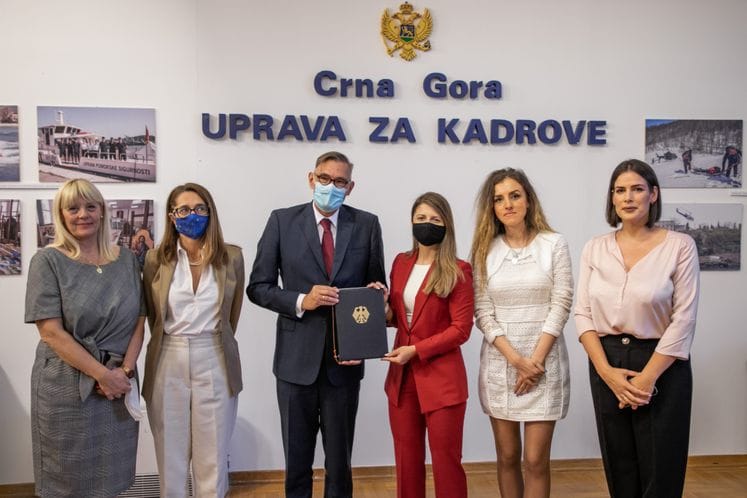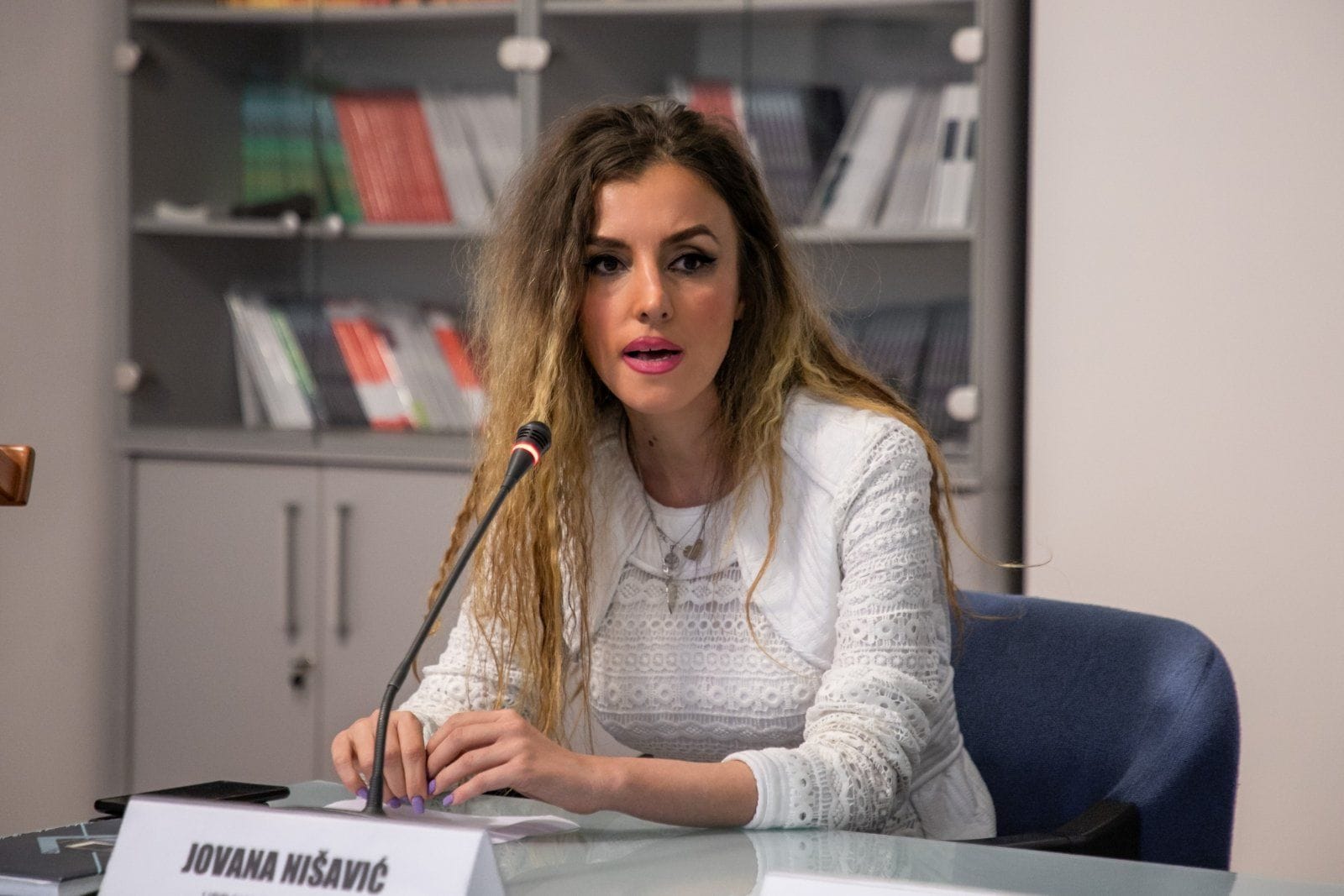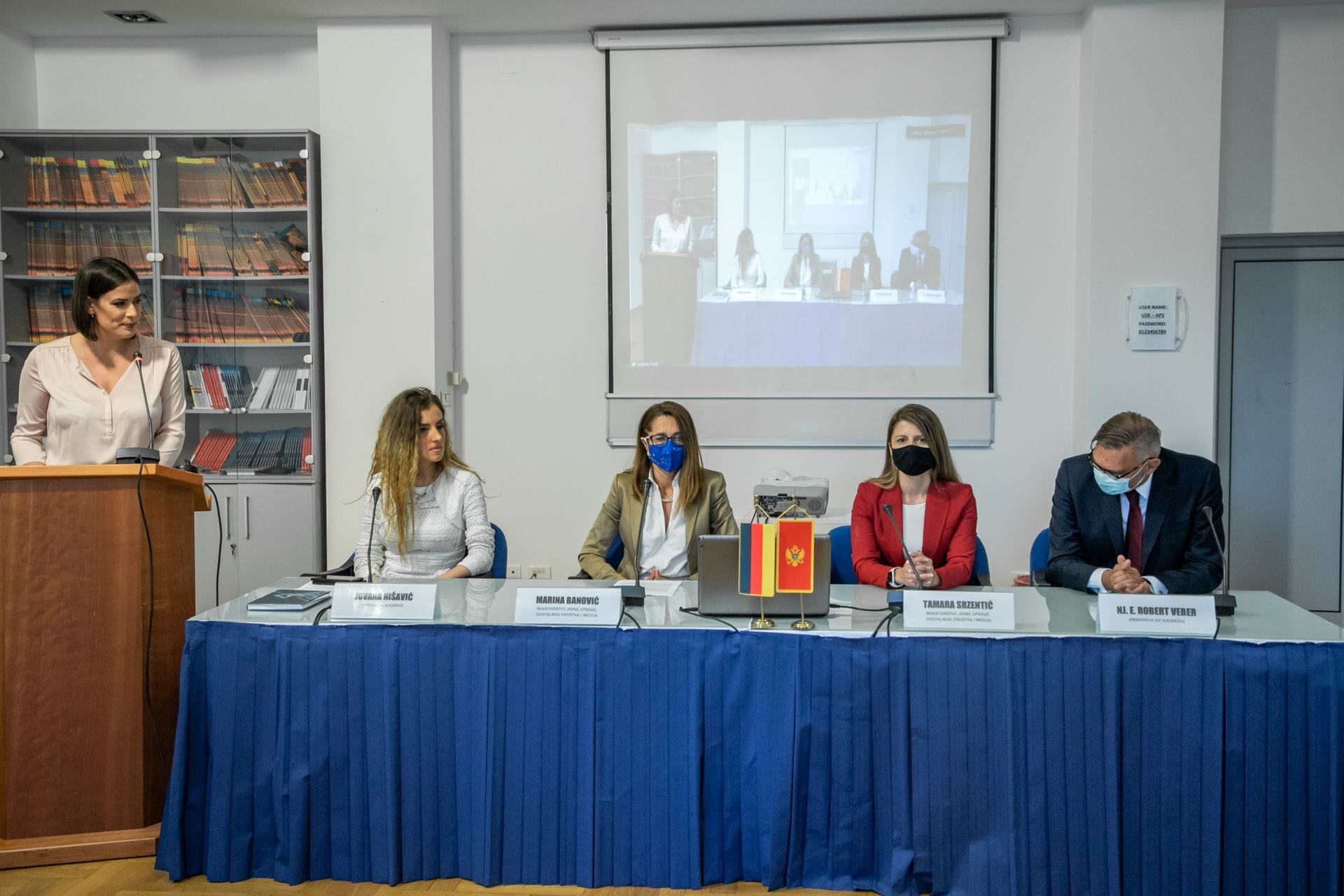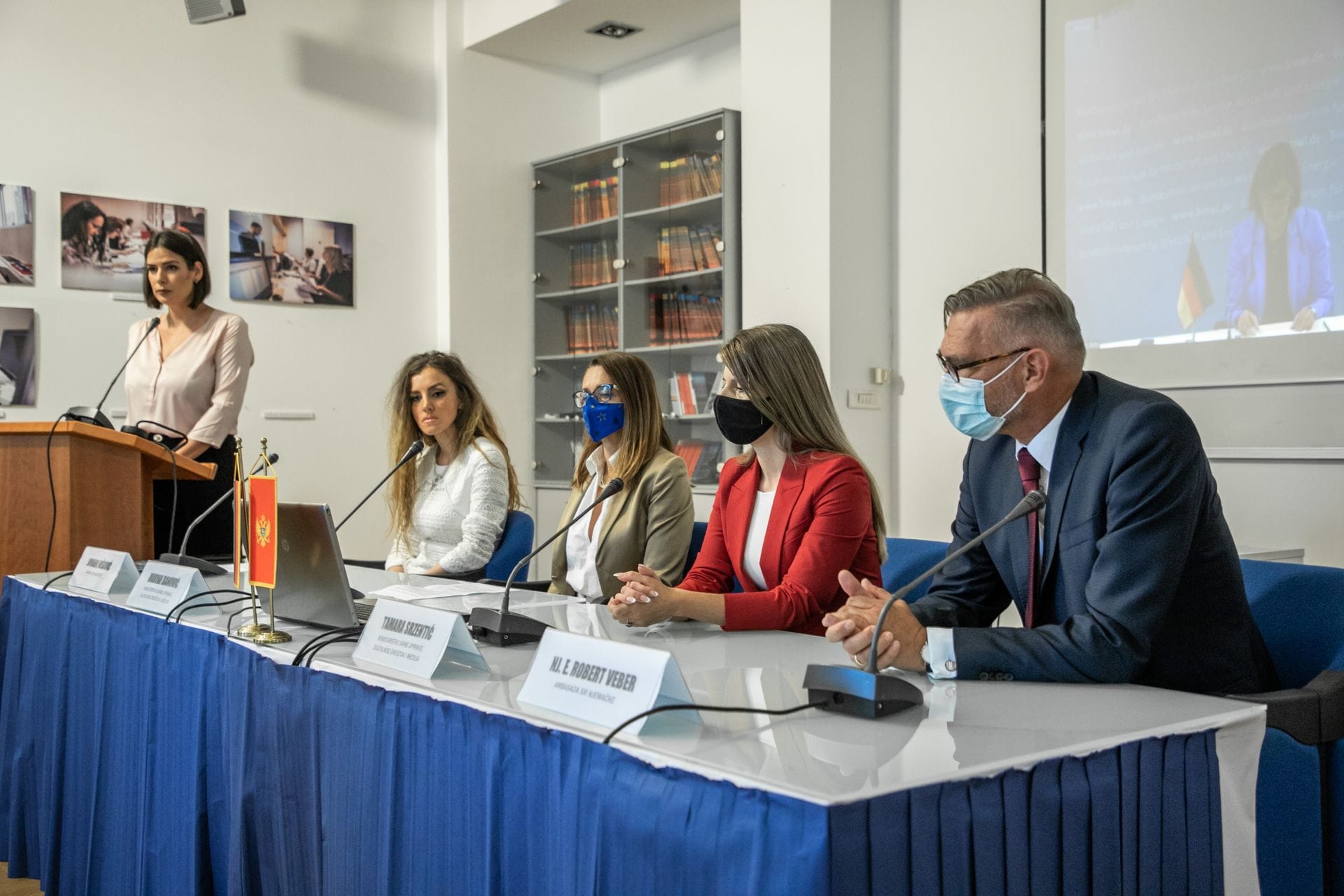- Government of Montenegro
Human Resources Administration Road to Digital Transformation in Public Administr...
Please note: The page below represents the archived content relating to the previous Government of Montenegro. Some of the information might be inaccurate or outdated.
Archive
Road to Digital Transformation in Public Administration Started

Published on: Oct 5, 2021 • 10:00 PM Author: UzK
Podgorica, PR service – Strengthening of public administration is one of the main challenges in the process of Montenegro’s accession to the European Union, EU, and in order to make it successful, it’s necessary to develop human resources continuously, open the road to digital education, whereas the investment in knowledge is everybody’s duty.
This was noted at the signing ceremony of the Joint Declaration of Intent among representatives of the Federal Ministry for Economic Affairs and Energy of the Federal Republic of Germany, the Ministry of Public Administration, Digital Society and Media and the Human Resources Management Authority.
State Secretary of the Ministry of Public Administration, Digital Society and Media, Marina Banović, a signatory thereto, said that the information and communication technologies play a key role in the smart economic development.
“The mission of our Ministry is to have an efficient and agile public administration, which creates and develops optimized processes and services for citizens. The strengthening of public administration is one of the key challenges in the accession process to the EU. In order to make it happen, it’s necessary to strengthen human capacities on an everyday basis, because investment in knowledge is a duty of the country, society and each one of us who have that privilege to be a leader of the teams.”
It’s especially significant, she said, that the Federal Ministry for Economic Affairs and Energy of the Federal Republic of Germany recognized “our efforts in this field and decided to enter into institutional partnership with our ministry and the Human Resources Management Authority”.
She also considers that it opens the road to digital education in public administration, which significantly contributes to general digitalization of the Montenegrin administration.
“In the time of speedy changes in working and living practices, the knowledge should be accessible in every moment and place. Thanks to the ILIAS platform, we’ll manage to do it. We’re going to expand and network the classic methods of learning thus enabling public servants to choose among the topics they want to learn and skills they want to develop, which provides them a constant professional development,” Banović explained.
The project “Support to Digital Training in the area of EU in WB public administrations” has already been implemented in Albania, Kosovo and soon in North Macedonia and Serbia. I’m convinced that this project, with support of our two ministries, will justify the expectations,” Banović added.
Acting Director of the HRMA, Jovana Nišavić, noted that the coronavirus pandemic had triggered a digital change in the area of professional training and development, both in the HRMA and every other institution in Montenegro.
"We have recognized that the strategic direction of digital transformation of the Government of Montenegro tackles all areas of public administration, economy and society, including the area of management and development of human resources, so the acquisition of digital skills is necessary for all employees in public administration. I’m very pleased that the institutional partnership with the German Federal Ministry for Economic Affairs and Energy gives us the opportunity to develop a digital training program," Nišavić said.
She particularly appreciates the practical approach of the project which enables employees to additionally develop digital skills and acquire didactic and practical knowledge regarding digital training as well as the topics from the EU area.

Director of European Policy, Dr. Kirsten Scholl, said that the German Federal Ministry for Economic Affairs and Energy had created a new instrument for improving cooperation known as administrative partnership, and its goals for this and next year are to improve the digitalization and connection between vocational education and training in the Western Balkans public sector, digitalization of public administration and improving the implementation of the Stabilization and Association Agreement with the EU.
Project leader, Professor Dr. Klaus Erdmann, explained that digitalization requires networking and cooperation, and the very concept of the digital learning platform will be presented next week at the Digital Summit of Western Balkan Economies, organized by the Ministry of Public Administration, Digital Society and Media, which will be our contribution to this important regional digital event.
"Along with managers and coaches of numerous organizations, we will work on the platform in order to develop skills of public servants. The support of the Ministry of Public Administration, Digital Society and Media in this project is therefore essential, especially in the area of IT competencies, for which we are very grateful to Minister Tamara Srzentić, the Human Resources Administration team, as well as the German Ambassador to Montenegro H.E. Robert Weber,” Erdman said.
Minister of Public Administration, Digital Society and Media, Tamara Srzentić, and the German Ambassador to Montenegro, H.E. Robert Weber, were in attendance as well.


This was noted at the signing ceremony of the Joint Declaration of Intent among representatives of the Federal Ministry for Economic Affairs and Energy of the Federal Republic of Germany, the Ministry of Public Administration, Digital Society and Media and the Human Resources Management Authority.
State Secretary of the Ministry of Public Administration, Digital Society and Media, Marina Banović, a signatory thereto, said that the information and communication technologies play a key role in the smart economic development.
“The mission of our Ministry is to have an efficient and agile public administration, which creates and develops optimized processes and services for citizens. The strengthening of public administration is one of the key challenges in the accession process to the EU. In order to make it happen, it’s necessary to strengthen human capacities on an everyday basis, because investment in knowledge is a duty of the country, society and each one of us who have that privilege to be a leader of the teams.”
It’s especially significant, she said, that the Federal Ministry for Economic Affairs and Energy of the Federal Republic of Germany recognized “our efforts in this field and decided to enter into institutional partnership with our ministry and the Human Resources Management Authority”.
She also considers that it opens the road to digital education in public administration, which significantly contributes to general digitalization of the Montenegrin administration.
“In the time of speedy changes in working and living practices, the knowledge should be accessible in every moment and place. Thanks to the ILIAS platform, we’ll manage to do it. We’re going to expand and network the classic methods of learning thus enabling public servants to choose among the topics they want to learn and skills they want to develop, which provides them a constant professional development,” Banović explained.
The project “Support to Digital Training in the area of EU in WB public administrations” has already been implemented in Albania, Kosovo and soon in North Macedonia and Serbia. I’m convinced that this project, with support of our two ministries, will justify the expectations,” Banović added.
Acting Director of the HRMA, Jovana Nišavić, noted that the coronavirus pandemic had triggered a digital change in the area of professional training and development, both in the HRMA and every other institution in Montenegro.
"We have recognized that the strategic direction of digital transformation of the Government of Montenegro tackles all areas of public administration, economy and society, including the area of management and development of human resources, so the acquisition of digital skills is necessary for all employees in public administration. I’m very pleased that the institutional partnership with the German Federal Ministry for Economic Affairs and Energy gives us the opportunity to develop a digital training program," Nišavić said.
She particularly appreciates the practical approach of the project which enables employees to additionally develop digital skills and acquire didactic and practical knowledge regarding digital training as well as the topics from the EU area.

Director of European Policy, Dr. Kirsten Scholl, said that the German Federal Ministry for Economic Affairs and Energy had created a new instrument for improving cooperation known as administrative partnership, and its goals for this and next year are to improve the digitalization and connection between vocational education and training in the Western Balkans public sector, digitalization of public administration and improving the implementation of the Stabilization and Association Agreement with the EU.
Project leader, Professor Dr. Klaus Erdmann, explained that digitalization requires networking and cooperation, and the very concept of the digital learning platform will be presented next week at the Digital Summit of Western Balkan Economies, organized by the Ministry of Public Administration, Digital Society and Media, which will be our contribution to this important regional digital event.
"Along with managers and coaches of numerous organizations, we will work on the platform in order to develop skills of public servants. The support of the Ministry of Public Administration, Digital Society and Media in this project is therefore essential, especially in the area of IT competencies, for which we are very grateful to Minister Tamara Srzentić, the Human Resources Administration team, as well as the German Ambassador to Montenegro H.E. Robert Weber,” Erdman said.
Minister of Public Administration, Digital Society and Media, Tamara Srzentić, and the German Ambassador to Montenegro, H.E. Robert Weber, were in attendance as well.


Related articles:
Is this page useful?
